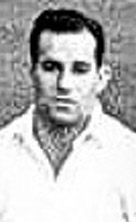By Clive Lloyd
I hasten to join the international cricket fraternity in tendering my condolences to the family and friends of the late Gerry Alexander and the Government and people of Jamaica. A true friend and cricketing colleague has passed away but he has left a legacy of commitment and love for West Indies cricket which ought to be emulated by those who play as well as administer the game. We have lost a true West Indian who not only loved this region and its people but who was also prepared to serve it professionally and in the field of cricket.
The excellent education he received at Cambridge and his own understanding of West Indian society and the place of cricket in it, made him hesitate when he was offered the captaincy of the West Indies cricket team in preference to Frank Worrell for the 1960 tour of the MCC. Gerry Alexander must have been deeply conscious that the social system and its resulting prejudices had denied both Learie Constantine and George Headley the opportunity to captain the West Indies team. In a non-paralleled act of graciousness Alexander tried to persuade the errant West Indian authorities at the time that he was not worthy. He knew that Worrell had superior claims. In his book, “A History of West Indies Cricket”, Michael Manley states, “Indeed, and to his undying credit, Alexander told the selectors that the time had come for Worrell to take over the leadership. However, the board insisted that they were impressed by the new sense of purpose and discipline which Alexander was beginning to instill in the team after the disastrous tour of England in 1957.”

Alexander, however, was so firm in his belief that he was right that when Worrell was finally appointed Captain for the 1960/1961 series against Australia, he did not demur in passing the mantle of leadership to Frank Worrell and, according to Manley, “publicly accepted Worrell as his leader and publicly extolled his virtues.” Alexander had done a rare thing: he had transcended the categories of race and class in making West Indies cricket his primary concern. But he did more. During the Australian tour such was his commitment that his batting reached new heights and he topped the batting averages, including scoring a century in the Third Test at Sidney. In other words, Alexander played an important if neglected role in this historic series, which saw the emergence of West Indian cricket as the potent force in the league of test playing nations.
I have particularly personal fond memories of Gerry Alexander. He was the manager of the team I took to India in 1974 and I can affirm that he was integrally involved in the management and development of a relatively young team. He was not aloof and he was excellent at team meetings, as he was able to persuade the players to speak their minds and to offer suggestions and recommendations beneficial to it. It was during this tour that I saw how absolutely he was committed to West Indies cricket and I would wish that our young players would take a leaf from his book. Gerry Alexander was a good student at the game and he was one of the first to advocate the use of neutral umpires. All in all, I have to conclude that even though his cricketing career was relatively brief, his achievements as both a cricketer and
administrator have been measurably beneficial to the cause of West Indies cricket.
I cannot forget that as a Veterinarian he worked for many years in Guyana for the Pan American Health Organisation (PAHO) and endeared himself to a wide circle of friends and acquaintances. As a resident of my country, he was always prepared in social and other gatherings to offer his views on West Indian cricket and what could be done to improve it. He was highly regarded, well respected and admired for his ability to mix easily with everyone. And even though I am not an expert on this matter, I suspect that he did his professional work with the same zeal and commitment that he played his cricket and lived his life.
I am sure that those in charge of West Indies cricket and the Government of Jamaica itself will see it fit to appropriately honour this outstanding West Indian cricketer.





